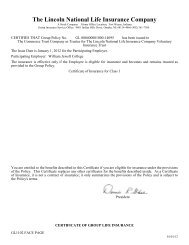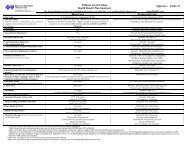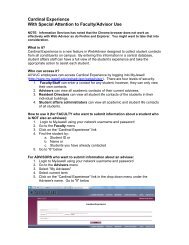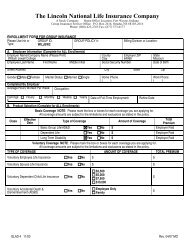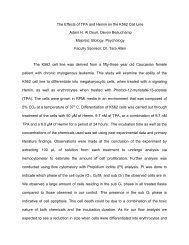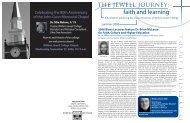About William Jewell College
About William Jewell College
About William Jewell College
You also want an ePaper? Increase the reach of your titles
YUMPU automatically turns print PDFs into web optimized ePapers that Google loves.
A student may wish to present a grievance against a faculty or staff member, or another student, when the<br />
issues cannot be resolved informally or by use of other regular <strong>College</strong> procedures. A grievance is a concern<br />
related to an alleged illegal or improper action not otherwise addressed in policies contained within the<br />
Student or <strong>College</strong> Employee Handbook. <strong>William</strong> <strong>Jewell</strong> <strong>College</strong> has set procedures for students who wish to<br />
present grievances. Academic related grievances, (i.e. an appeal of a course grade), should go through the<br />
Provost’s Office.<br />
The student wishing to present a grievance should file a formal written complaint with the Dean of Students or<br />
the Assistant Dean of Students to identify his/her particular grievance. The student should present the<br />
complaint as promptly as possible after the alleged incident and at least within 12 months of the occurrence of<br />
the incident. The formal written complaint should include the following information:<br />
Date(s) and Time(s) of the alleged incident(s);<br />
Names of all person(s) involved in the alleged situation, including possible witnesses;<br />
All details outlining what happened during the alleged incident;<br />
Student’s contact information so that the <strong>College</strong> may follow up appropriately.<br />
Students filing a written grievance with the Office of Student Affairs may be required to meet with a staff<br />
member face-to-face to answer questions and provide more contextual information related to the alleged<br />
incident. The Dean of Students and/or the Assistant Dean shall at this point suggest a course of action or<br />
alternate channels for resolving the potential problem. Depending upon the resolution sought, the student<br />
may ask to remain anonymous, however, anonymity cannot be guaranteed in all circumstances.<br />
If the student refuses to submit their grievance in writing and/or refuses to meet with <strong>College</strong> staff when<br />
requested to do so, the <strong>College</strong> reserves the right to not respond to the filed grievance; although a copy of the<br />
report will be left in the student’s file within the Office of Student Affairs.<br />
A Student officially filing a grievance needs to understand that some grievances may lead to disciplinary action<br />
against another student and may require the student to play a role in a disciplinary hearing. In each case, the<br />
Office of Student Affairs will advise the student of their rights and the rights of others as outlined in the<br />
<strong>College</strong>’s Standard of Conduct and Student Disciplinary Processes.<br />
Sexual Harassment<br />
<strong>William</strong> <strong>Jewell</strong> <strong>College</strong> is committed to protecting the rights and dignity of all students and employees and<br />
accordingly will not tolerate sexual harassment in the classroom or workplace. All students and employees<br />
have the right to work in an atmosphere free from sexual harassment.<br />
Rationale<br />
Sexual harassment is a violation of federal and state law and places the college in a precarious legal position.<br />
More importantly, sexual harassment subverts the mission of the college. In both obvious and subtle ways, the<br />
possibility of harassment is destructive to individual students, faculty, staff and the academic community as a<br />
whole. When, through fear of reprisal, a student or employee is exposed to unwanted sexual attention, the<br />
college’s ability to carry out its mission is undermined.<br />
Sexual harassment is especially serious when it threatens relationships between faculty and student or<br />
supervisor and subordinate. In such situations, sexual harassment exploits unfairly the power inherent in a<br />
faculty or supervisor’s position. The college also recognizes that harassment may occur between persons of<br />
Page 50 of 99




